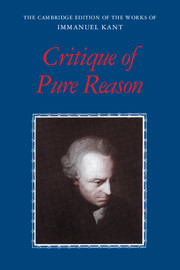Book contents
- Frontmatter
- Contents
- General editors' preface
- Acknowledgments
- Introduction
- Immanuel Kant, Critique of Pure Reason
- I Transcendental doctrine of elements
- Division two. Transcendental dialectic
- Book I On the concepts of pure reason
- Book II The dialectical inferences of pure reason
- Chapter I The paralogisms of pure reason (as in the first edition)
- Chapter I The paralogisms of pure reason (as in the second edition)
- Chapter II The antinomy of pure reason
- Chapter III The ideal of pure reason
- Appendix to the transcendental dialectic
- II Transcendental doctrine of method
- Editorial Notes
- Glossary
- Index
Chapter I - The paralogisms of pure reason (as in the second edition)
from Book II - The dialectical inferences of pure reason
Published online by Cambridge University Press: 05 July 2013
- Frontmatter
- Contents
- General editors' preface
- Acknowledgments
- Introduction
- Immanuel Kant, Critique of Pure Reason
- I Transcendental doctrine of elements
- Division two. Transcendental dialectic
- Book I On the concepts of pure reason
- Book II The dialectical inferences of pure reason
- Chapter I The paralogisms of pure reason (as in the first edition)
- Chapter I The paralogisms of pure reason (as in the second edition)
- Chapter II The antinomy of pure reason
- Chapter III The ideal of pure reason
- Appendix to the transcendental dialectic
- II Transcendental doctrine of method
- Editorial Notes
- Glossary
- Index
Summary
Now since the proposition I think (taken problematically) contains the form of every judgment of understanding whatever, and accompanies all categories as their vehicle, it is clear that the inferences from this proposition can contain a merely transcendental use of the understanding, excluding every admixture of experience; and of such a procedure, after what we have shown above, we cannot at the outset form any very favorable concept. Thus we will follow it through all the predications of the pure doctrine of the soul with a critical eye, <yet for the sake of brevity we will proceed to examine them in an uninterrupted exposition.
To begin with, the following general remarks can sharpen our attentiveness to this mode of inference. I do not cognize any object merely by the fact that I think, but rather I can cognize any object only by determining a given intuition with regard to the unity of consciousness, in which all thinking consists. Thus I cognize myself not by being conscious of myself as thinking, but only if I am conscious to myself of the intuition of myself as determined in regard to the function of thought. All modi of self-consciousness in thinking are therefore not yet themselves concepts of the understanding of objects (categories), but mere functions, which provide thought with no object at all, and hence also do not present my self as an object to be cognized. It is not the consciousness of the determining self, but only that of the determinable self, i.e., of my inner intuition (insofar as its manifold can be combined in accord with the universal condition of the unity of apperception in thinking), that is the object.
- Type
- Chapter
- Information
- Critique of Pure Reason , pp. 445 - 458Publisher: Cambridge University PressPrint publication year: 1998

